Hrishikesh Mukherjee’s Abhimaan is a beautiful film about a singer-couple Subir (Amitabh Bachchan) and Uma (Jaya Bachchan) and the turbulence in their marriage. When the woman becomes more successful, the man falls into the throes of jealousy and insecurity. Abhimaan is about the conflict between our different emotions and our struggle to accept and acknowledge them. The film and its music is deeply moving. It also has one of my most favorite characters in films—Chitra—played by Bindu.
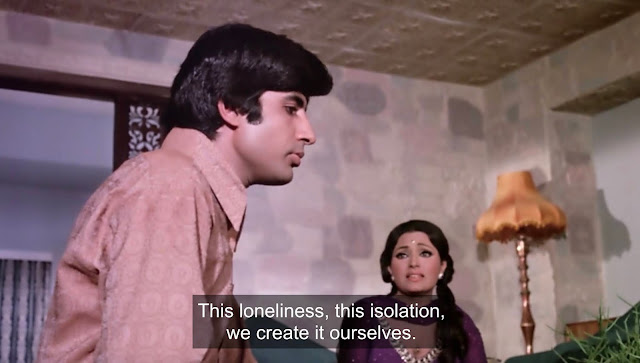
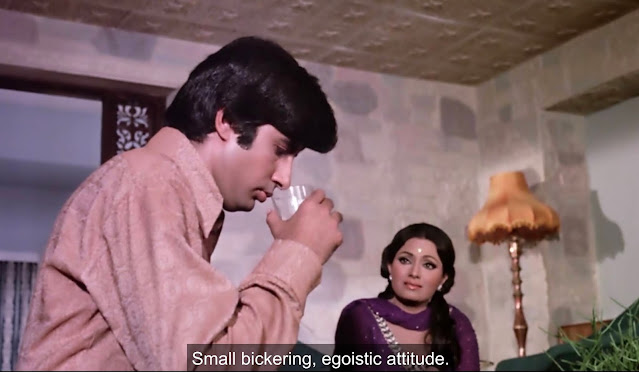
Chitra is a wonderful friend of Subir. She does what a good friend does—save the friend from self-destruction. She encourages him when he is feeling low. She berates him when he does not do the right thing. She is also someone who thinks a lot about life and its vagaries. She has a conversation with Subir where they talk about the loneliness of life. Every one of us is alone, she believes, and this loneliness is created by us due to our petty ego—chhote chhote abhimaan aur chhote chhote aham. Chitra finds comfort in this loneliness as the world seems a far better place with it. She enjoys the melancholy of life and connects with the virah in sad songs. She calls them the real musical notes of life. In this sense, she is not different from Anand (Rajesh Khanna) from Hrishikesh Mukherjee’s film of the same name, who also found the sadness in songs beautiful. “Udaasi khoobsurat bhi hoti hai,” he says to his friend Bhaskor (Amitabh Bachchan). Chitra’s inner sadness comes from her unrequited love for someone whose name she has locked in a safe deposit but it is clear that that person is her friend Subir. She loves the music and the man who brings that music. She brings his music into her soul. Aap ke is aasmaani sangeet ko rooh ke andar utaar rahi thi.
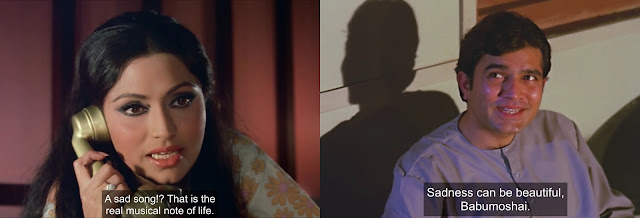
Subir falls in love with Uma and marries her. At their wedding reception, they melodiously begin the musical journey of their life. Coming to the function must not have been easy for Chitra but she shows up for her friend Subir. It is beautiful to see someone who does not shy away from acknowledging their true feelings. When Chitra meets Subir, she tells him that she was really hurt on hearing the news of his wedding. She fell into the abyss of loneliness and her life lost all its meaning. She tries to rationalize Subir’s decision to marry Uma and not her by (unfairly) blaming it on the lack of her own musical skills. And, yet, there is no trace of jealousy on her face. Chitra greets Uma with utmost respect and dignity because somebody special to Subir is special for her, too. She understands that one cannot force somebody to love them. She is Subir’s friend and does not ask for anything more than friendship. Their relationship will remain like before.
Uma has come in between Chitra and Subir
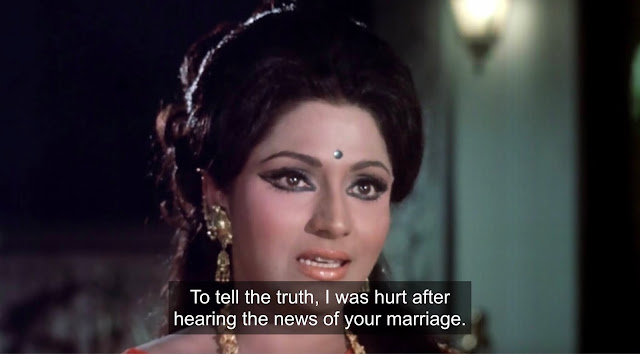
With Uma’s rising fame and popularity, Subir’s insecurity begins to rise as well. The chhote chhote abhimaan that Chitra earlier mentioned start deteriorating Subir’s relationship with Uma. He finds comfort and refuge in Chitra’s house. She is always there for him. Chitra never tries to instigate Subir against Uma even though she could easily have given her feelings for Subir. Uma is also aware of the proximity between Chitra and Subir; therefore, without anyone telling her, she turns up at Chitra’s home to meet Subir as she knows he will be found there. The ensuing conversation between the two women further depicts the maturity and thoughtfulness of Chitra. As a friend, Chitra is worried about Subir’s descent into alcoholism and wants to know the reason behind his sadness, his silence, and his sombreness. Uma does not want to reveal it. Chitra immediately reads Uma’s hesitance and understands that it is a personal matter between a husband and a wife. She stops herself from further probing and remains in the confines of friendship, never overstepping her boundaries. Chitra also tries to clarify with Uma that she did not mislead Subir as her relationship with him could be misinterpreted. However, this time, Uma immediately stops her by saying, “Jo pyaar karta hai woh kabhi,“ and leaves it there. This ambiguous and incomplete statement by Uma could be read in many ways, but to me, it felt like a subtle acknowledgment of Chitra’s love for Subir by Uma. Both Uma and Chitra are so much more mature than Subir, who then enters their conversation. Chitra stops him from insulting Uma and asks him to leave her home, again doing the right thing at the right moment.
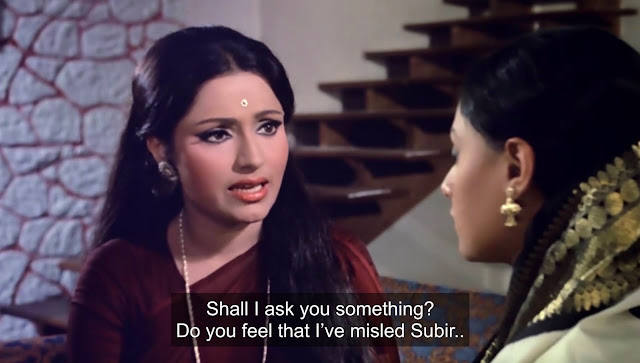
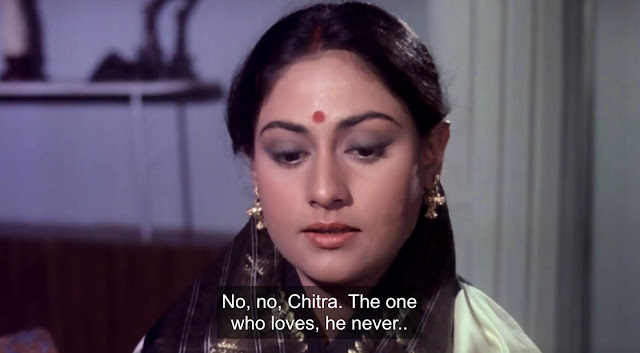
The aforementioned scene also reminded me of the lovely scene between Parvati (Aishwarya Rai) and Chandarmukhi (Madhuri Dikshit) in Sanjay Leela Bhansali’s Devdas that came nearly thirty years after Abhimaan. The two women in the life of Dev (Shah Rukh Khan) bonded over a man they both were in love with. Like Uma’s acknowledgment of Chitra’s love for Subir, Paro does the same and gives the same respect to Chandramukhi’s love. They even dance together. It is noteworthy that when Subir’s ego starts to inflate, Abhimaan also compares him with the eponymous Devdas. At some stage in the film, Chitra requests Subir to stop drinking and move on with life. Subir replies that she is talking like Chandramukhi of Devdas and then goes onto to say one of the most iconic lines of Devdas—”Kaun kambhakht bardaasht karne ke liye peeta, main toh isliye peeta hoon ke hosh me na rahun.” Who drinks it for bearing pain, I drink so that I don’t remain in my senses. Subir and Devdas are the same where their ego takes them on the path of self-destruction, overtaking the love for the women in their life. Uma is Parvati and Chitra is Chandramukhi and one can discern many other similarities between them even though Abhimaan explicitly mentions it once.
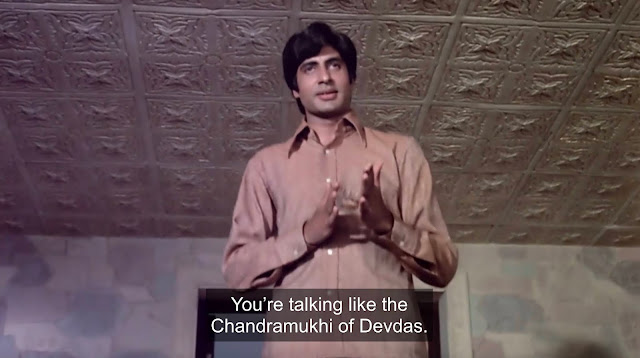
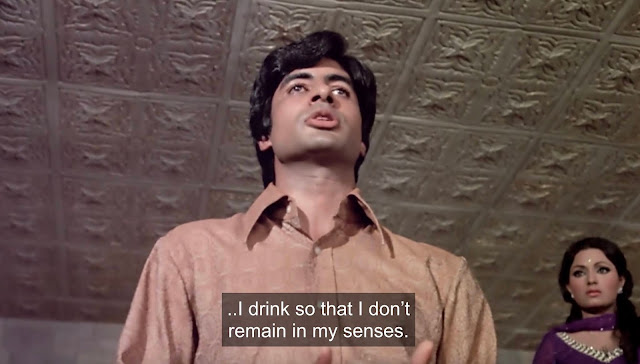

Early in the film, Chandru (Asrani) tries to dissuade his friend Subir from developing a relationship with Chitra. He believes she is not the right girl as Subir’s ideal woman should be like his mother who can take care of him. The rich and liberal Chitra who likes to drink is only distracting him from his path of becoming a great singer. The fact that Chitra is played by Bindu who is known for the portrayal of negative characters on the screen initially makes us feel that Chitra would also turn out to be a vamp but the film actually makes her one of the strongest and the nicest characters in the film. In that sense, the film humanizes both Chitra and Bindu. Jai Arjun Singh in his book The World of Hrishikesh Mukherjee provides another insight on this aspect. He writes, “Much has been made of the unusual casting of Bindu (as Chitra) in Abhimaan and Aruna Irani (as Ruma) in Mili, in potential ‘bad girl’ parts that turn out to be shady and sympathetic (these are characters who would have been straight vamps in other films of the time, and the same actor did specialize in such roles). However, another possible interpretation is that turning these ‘fast’ women in melancholy figures with conflicted lives and deep emotional reserves is a way of shying away from the sexually proactive woman who is unapologetic about herself.”
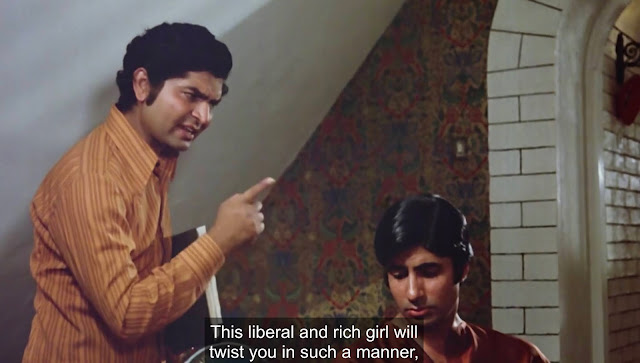
Chitra is graceful, thoughtful, and philosophical. Her frankness and maturity make her such a genuine person. One can trust her even with their life because they know she will do the right thing. She understands people and their emotions. She is self-aware and knows her boundaries. She is a great friend, and above all, she is a great human being. To have the presence of someone like her in one’s life is truly a gift.
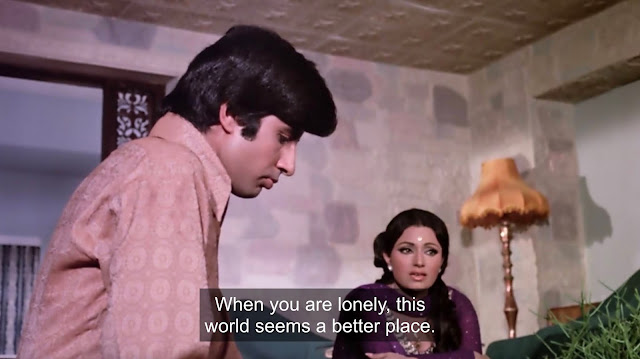
[Read more of the author’s work on his film blog here]





Leave A Comment
You must be logged in to post a comment.